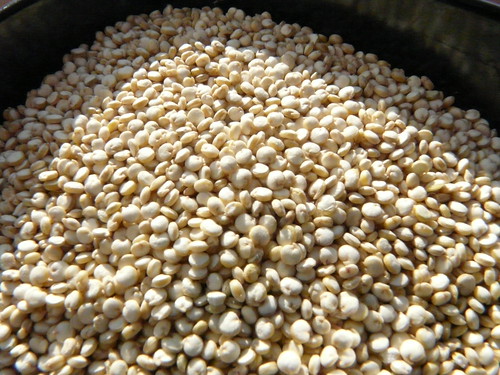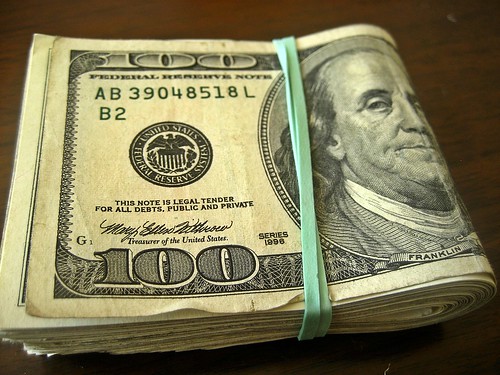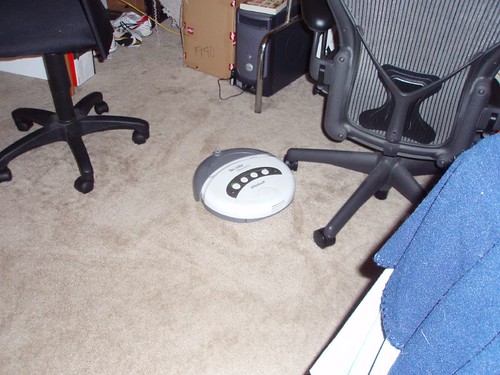Everyone told me that becoming a full-time faculty member would be a huge change in my time management, but I had also been working an 8-5, so I thought I was well-prepared.
I was both right and wrong. Since I was already used to getting up, I scheduled myself for 8am every day. Many of my colleagues balk at such an early routine, but I was already used to it, so it's been an easy transition. Starting the day early also means that I have flexibility in my afternoons.
And flexibility is good because I was wrong about how easily I would adapt. Sure, I was already working full-time before, but this is different. The little things pile up quickly and my days are less predictable. Before, I had set times to catch up, but now that time may be taken up by a student who needs to talk or a last-minute meeting. Also, having to be at a desk for eight hours a day often drove me crazy, but it gave me a lot of time focused on a single task.
Overall, though, I'm managing the balance fairly well. I'm teaching a full-time course load, raising a very active toddler, taking a graduate-level Spanish translation class, working on my PhD exam, writing this blog, and still finding time to do things like hang out with my family and friends.
People sometimes ask me how I do "it all." My initial answer is "I don't." I think that the message that we have to do it all is a damaging one. There's a lot of "all" out there. I'm satisfied with picking out the pieces that feel important and ignoring the rest. And sometimes even those pieces are an absolute mess because we are more than a snapshot of our lives at any given moment. Our lives and the circumstances surrounding them change, and we change with them. Doing it all is a myth.
But I do think there are some very practical ways to make balancing multiple roles a little easier. Here are the ones that are most important to me.
SPACE
Create Separate Spaces for Different Realms . . . I move back and forth between my home, the campus I work on, and the campus where I'm a student. At first, I thought I could just stay in my faculty office. I realized quickly that wasn't the case. Instead, I set aside time each week where I go to the other campus and sit in the library to do work for my PhD. When I tried to do that work in my office, I was still focused primarily on my role as teacher, and there's always something for a teacher to do. I couldn't pull myself out of the teacher role long enough to get into the student role.
Similarly, I have different parts of my home that I mentally associate with work. The dining room table is the place where I grade papers or do homework. It provides the most functional surface and it gets me away from the living room (where the TV lives) and the kitchen (where the dirty dishes taunt me like middle school bullies).
 |
| "Your mama's so ugly she can't even finish her Spanish translation." |
Finally, I joined a YMCA that's located halfway between my house and work. It makes it (relatively) easy to fit in a workout without drastically changing the rest of my schedule.
. . . But Keep them Flexible.
Even though I have separate spaces for separate occasions, it can become easy to fall into a trap of rigidity. If I convince myself I can only study in the grad school library, for instance, then it's not all going to get done. There are days when I won't be able to make it to library. My daughter might get sick. My husband might go out of town. Things are bound to go wrong. So I have spaces where I prefer to do certain things, but I also make sure to keep enough of the stuff I need for any given role on hand that I can do the most important things from anywhere. And if that means that I run outside one afternoon because the route home isn't taking me by the gym or if I end up closing my office door when my office hours end and forcing myself to read some Cicero, then that's what happens.
And that brings me to . . .
STORAGE
Have Separate Bags for Each Role. . . I am a bag lady. I have a work bag that contains my laptop, notebooks, and pens. I have a tote that contains the books I need for the classes I teach and the papers I have to grade. I have a gym bag that contains my gym clothes and toiletries. I have a lunch bag that contains, appropriately enough, lunch.
It can be a pain to get out of the house with all these bags, but separating the stuff out lets me know that I'll have the right thing in the right place. I can leave my gym bag in the car while I'm at work, and I have my laptop in a sleeve so I can slip it into the gym bag and lock it up (I live in a city, and I really don't want to have my laptop stolen). If I don't need the books to go home with me, I can leave them in my office and fold up the tote bag. Having all of these different bags may make me look unhinged when I'm walking out of the door, but they make my day
much easier.
. . . But Have a Stable One, Too.
All that said, I was having a problem. I was moving my daily necessities--wallet, keys, phone--from bag to bag throughout the day. Finally, I got a little purse to keep these things in and it goes with me no matter what activity I'm going to. If I'm going to the gym, it can fit in the gym bag. If I'm going to work, it fits in my desk drawer. If I'm in the library, it fits in my work bag. And if I have to run to the store, I can take it by itself.
The other form of stable storage: electronic. I know it's not completely stable. The internet can break. Files get lost. But having things saved in Google Drive or on my flashdrive (which also stays in that go-everywhere purse) means that I have a lot of information and work on hand no matter where I go. (And I've
already written a post on what other pieces of technology help me out the most.)
TIME
Allow Yourself More Time than You Think you Need . . .
Early on, I was underestimating the time it would take to get things done. Two hours would be plenty to grade those papers, I thought. If I have thirty minutes, I can finish that Spanish homework. I would schedule myself back to back to back and then when something ran over it would throw
everything off. So I started overestimating the time it would take to do things. Sure, my daily plan looks less impressive, but it's much less likely to send me into a tailspin by dinnertime.
. . . But Don't Forget the Value of a Few Minutes.
But then I found I was doing the opposite. I would schedule myself an hour to do my Spanish homework, and then it would only take 45 minutes. I'd look at the clock and say to myself, "Oh, 15 minutes. That's not enough time to do anything." And then I'd zone out and play Triple Town or something (don't play Triple Town. It's addictive.) Now, I'm not saying that you should
never zone out and do nothing or something less "valuable." Everyone needs to look at a celebrity slide show on Huffington Post or kill some zombies with anthropomorphic plants now and then (don't play Plants vs. Zombies. It's even more addicting.) But when that happens three or four times a day, you end up eating up a lot of time that you could have used to get something else checked off your list. And I prefer to have very busy days so that I can have more relaxed evenings. By six or seven, I want to be
done to spend some time with my family and check Facebook or whatever. That doesn't happen every day, but it wouldn't happen at all if I didn't take advantage of that "extra" time during the day.
Sure, 15 minutes isn't enough time to grade a stack of 25 papers, but it
is enough time to grade a few of them. If I do that a couple times over the course of the day, I've made a real dent in it. The trick (for me) is to identify a set of tasks that can happen with interruption. This is particularly important when I have time between student meetings because students notoriously show up late or not at all. If I constantly put off starting any task because I was waiting for a student, I might end up doing that for an entire hour without anyone ever coming by. Grading short papers, checking email, reading for class, short lesson planning are all things that I can start and stop without a lot of trouble.
CATEGORIES
Separate Out the Different Parts of Your Day by Role . . .
So, I have separate spaces and bags and tasks based on what role I'm playing. It's pretty clear that I spend a lot of time separating my day out into different roles. I alternate between focusing on being a teacher, mother, wife, friend, student, daughter, etc. throughout the day. Separating the goals and ways to reach each of these things in my mind is sometimes really important.
. . .But Don't Worry When They Bleed Together
But I can't ever pretend like I'm not a mother while I'm teaching or that I'm not a teacher while I'm a student. Some of my roles are with me constantly, and that's okay. If I'm hanging out with friends and I see a news story about education that's important to my role as a teacher, I'm going to pay attention to it. If I'm teaching and I get a call from daycare that my daughter is sick and needs to be picked up, I'm going to go get her. The goal is not to break myself into a robot with modes that can be activated with the flip of a switch; the goal is to do the best job I can to balance these roles on any given day.
And that balance isn't the same every day. I think of it like the Sims (geez, I've mentioned like three completely addicting games in this post. I'm sorry.) In the Sims (or at least the last version I played, which was a few years ago) there were bars that measured your Sim's happiness broken into categories like "Hunger" and "Socializing" and "Hygiene" and "Bladder." They didn't all have to be full for your Sim to be happy. The Sim could be pretty hungry, but as long as those other things were taken care of, s/he would be okay. However, once any one of those bars dropped down to the danger zone, it didn't matter how well the other ones were taken care of. Basically, even if you're in a room full of great friends with good food, peeing your pants is still going to put you in a bad mood.
So, I can let some things slide as long as the overall balance on my different responsibilities is taken care of. I can put off grading a stack of reading responses for a day or two as long as my students have gotten the feedback on their major paper. I can wait to do that reading for my PhD exam as long as I've been keeping in touch with my advisor and feel on track. But as soon as something crashes, it needs all my attention, so I have to keep it up to a reasonable level.
And that brings me to:
FAILING
Avoid Picking Apart Every Little Thing You Didn't Do . . . Sometimes things aren't going to work out. There are going to be days when nothing goes right. There are going to be days when the car breaks down and the daycare closes and your dinner burns and the computer crashes. There are going to be times when you feel like you're failing. Stop beating yourself up over it and get back on track for the next day. The longer you spend agonizing over every little thing that you could have, should have, would have done differently, the longer it will be until you can actually do anything differently.
. . . But Let the Meltdown Happen When it Comes.
That said, sometimes you just have to break down. Sometimes trying to attack everything with a healthy dose of optimism and a can-do attitude is just damn exhausting. Grab a pitcher of margaritas (or whatever your equivalent is) and some friends and let it all out on the table. Then try again later.
What would you add? How do you keep things together?
Disclosure: This post from my archives is being re-run as part of BlogHer's Smart Mom's Guide to Being Busy editorial series, brought to you by Rice Krispies and BlogHer.





















